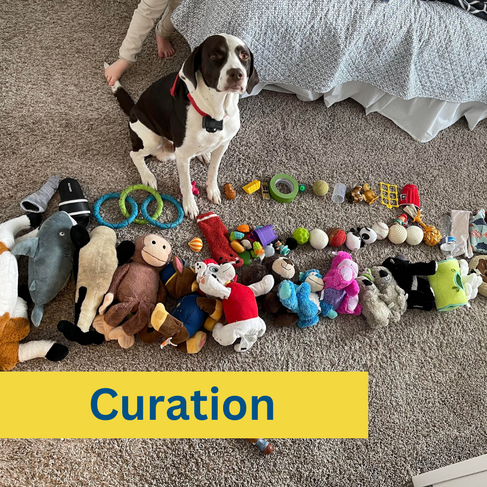3 New Career Team Superpowers
- Margie McGee-Newton

- Mar 6, 2023
- 5 min read
By Margie McGee-Newton
Creative and Content Manager, Consultant
The Career Leadership Collective

Let’s start with a quick quiz.
1. Pick the photo that represents the most in-demand skill for staff in your office:
2. Select the Reality TV show that is most aligned with what your team is experiencing today.
Ok. This quiz is clearly not science-based, but we hope your answers represent a recognition that times have changed, and how we approach our work must also change.
Some Context
I started my first full-time job in higher education on January 3, 2000, at a small private art school with a student population of 700. I was the sole staff person for a one-stop student support office. We provided disability accommodations, writing support, and technology tutoring.
Our office was open 65 hours a week. On average, I met with 45 students per week for 30-minute one-on-one conferences. I also hired, trained, and supervised a student staff of 12 - 26 students. I was in this role for 13 years, and I knew the name of every faculty member, full-time and adjunct.
When I left this role, I walked away, leaving a binder I created for my first maternity leave titled "How to Be Me." This resource was not a user-friendly transition for the person who took my place. If I could rewrite that manual with what I know now, I would tell them to focus on developing different superpowers because times were (and are) changing.
Shifting Skillsets
I moved from a tiny campus of 700 to a land-grant institution with 50,000 students. Since then, I've enjoyed working at a small liberal arts college and a large private university with an urban campus.
In my 20+ years in higher education, I have observed a shift in skillsets and job functions primarily focused on scaling services and activating the campus and community ecosystem. Some of these shifts relate to staffing changes, but many are the product of increasing awareness of student behavior/preferences, insights from learning experience design, and data-based best practices.
In this next section, I will describe some new team superpowers and outline how they serve students, faculty, and employers in 2023.
Superpower #1: User Experience
The college experience has changed radically for most students. Students have also changed. Career Center services must be designed for this new user looking for frictionless learning, grab-and-go content, and authentic connections. Beyond generalizing about the needs and wants of Gen Z, knowledge of user experience strategies enables a career team to design and assess services, content, and experiences that are scalable and impactful.
It's very easy to create a service or programming for an audience based on assumptions about who they are and what they need. As an example of this tunnel vision, I was in a zoom meeting in early 2022 with a Provost who confidently announced, "We all know that in-person advising is better." This was after an entirely virtual year with a considerable increase in completed advising appointments (with higher net promoter scores!).
Innovation and improvement only happen with a willingness to ask questions about all users' needs open-mindedly and the skills to examine the distinct experiences of every stakeholder.
Ok. So we understand our stakeholders now. What next?
Superpower #2: Systems Thinking
In higher education, relationship building has always been an in-demand skill. Almost all of us have honed skills in winning over faculty, connecting with alumni, and engaging employers. However, systems thinking is a skill KEY to designing and leveraging relationships. In an ideal universe, career development is everywhere on campus - from faculty to coaches of student-athletes to admissions conversations to academic advising and the disability support office.
It's common in higher education for one (or several) charismatic career center staff to develop robust partnerships with different stakeholders. This can work, but it could be more scalable and sustainable. I've witnessed that losing a single staff member can take an important partnership back to zero. A leader with skills in systems thinking can design scalable partnerships that enable the campus ecosystem to SHARE resources and make career unavoidable.
But how do we persuade our stakeholders to partner with us?
Superpower #3: Data Storytelling
In this section, we will double down on the importance of data and how it is core to all of our work.
According to an Accenture report, The Human Impact of Data Literacy Report, "Three quarters (74%) of employees report feeling overwhelmed or unhappy when working with data." This number might be higher in higher education. ¯\_(ツ)_/¯
Technology has enabled us to track various metrics in ways I could not have imagined long ago. I remember counting advising records with a Swingline Rubber Finger Tip! Now, I can have a student scan in for a workshop or provide a student ID for a webinar. I can also deploy polls, not to mention the robust FDS services we all use.
However, just because we collect data does not mean we successfully use it to tell a story that prompts action. These actions vary from deciding to declare a major, choosing a college, seeking an internship, adopting a career-focused assignment for a classroom, recruiting on campus, funding a paid internship opportunity, or adding a required career course to a curriculum. An effective call to action depends on the ability to craft a compelling data story for various audiences.
Sometimes when we think of data storytelling, we simplify this concept to a pie chart or data visualization. There's no doubt that visualizing data is impactful for immediacy, but equally important is the ability to craft a narrative that provides context and relevance and allows readers to interpret complex information that informs decision-making.
We love the power of persuasion, but when and how do we have time to upskill?
Many of us feel these skills are unreachable or only available as part of a formal credential. But they're not. It might be as simple as creating a culture of collaborative skill-building that empowers others to practice these new skills in a supportive environment. The whole team doesn't have to take on a new data project, but are there folks in your office who are ready to build specific superpowers? Not to gild the lily, but prioritizing skill development is also a great way to retain top talent.
Acquiring these skills depends on curiosity and the willingness to apply new skills to the work we're already doing.
Interested in formal, cohort-based, upskilling?
Check out our three cohort-based professional development programs: Kickstart (for emerging professionals), Aspire (for aspiring leaders), and Mastermind (for leaders looking to innovate).
I can't wait to see some of you in Atlanta at the Collective 2023!
Margie McGee-Newton, Creative and Content Manager, Consultant
The Career Leadership Collective

Margie McGee-Newton has twenty years of experience in higher education. She has worked with a wide variety of institutions, including the Minneapolis College of Art and Design, the University of Minnesota, Wellesley College, and DePaul University. In her most recent role as the Director of Career Education at the DePaul Career Center, she oversaw career education initiatives for 19,000+ students and an alumni population of over 120,000.
In this role, she led the creation of a 50+ library of scaffolded micro-learning career content, including 15+ videos and a collection of “career activities” ranging from interactive branding workshops to peer-led resume reviews. She also piloted a first-year career experience that is both a yield and retention initiative, unique in its “sprinkle approach” to learning. This program, called Future Forward, has doubled in size in its first three years and has demonstrable impacts on retention and student confidence.
She is passionate about bringing sensitivity and appreciation for a user experience lens to higher education and leveraging accessible and engaging learning experiences to connect learners to meaningful and actionable content.




















Comments